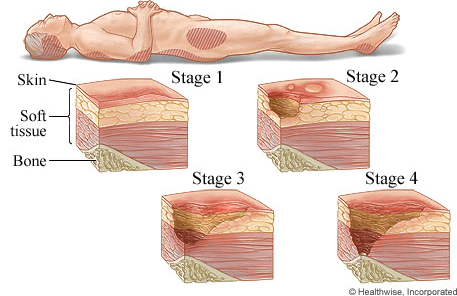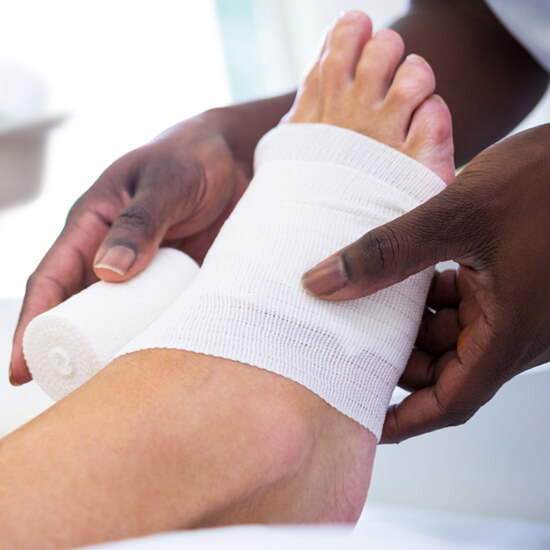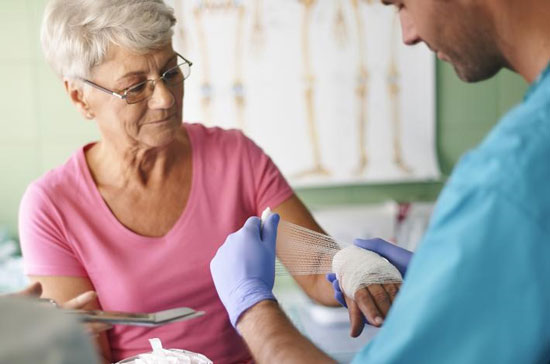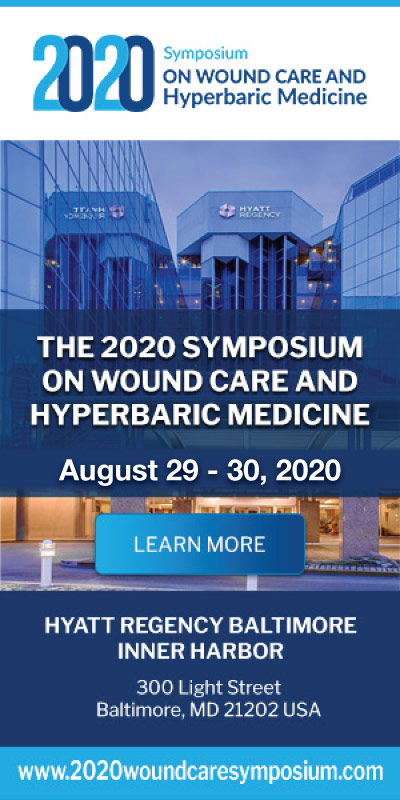
Wound Care
WHAT IS WOUND CARE?
If a wound doesn’t improve after four weeks, or does not heal within eight weeks, it is considered a non-healing wound and specialized wound care may be necessary. Non-healing wounds can cause deeper skin erosion, infection and complications which can be damaging to organs and limbs, and even be life threatening. An estimated 6.7 million Americans suffer from a non-healing wound consisting of mostly cardiac patients, diabetics, amputees, surgical patients, cancer survivors and others. Among the most commonly treated wounds are those sustained from an acute injury, surgical wounds, diabetic wounds and pressure sores.
MVS Wound Care & Hyperbarics offers specialized, outpatient care for non-healing wounds and other injuries, including hyperbaric oxygen therapy. Our team of doctors, nurse practitioners and nurses provide treatments to promote healing of chronic wounds and help patients recover as quickly as possible.
MVS Wound Care & Hyperbarics specializes in difficult to heal or non-healing wounds of all types including, but not limited to:
- Diabetic ulcers
- Arterial ulcers
- Pressure ulcers
- Bone infections
- Crush injuries
- Thermal Burns
- Venous ulcers
- Infected wounds
- Surgical wounds (skin grafts/flaps)
PRESSURE ULCER STAGING

WHAT IS A STAGE 1 WOUND?
Wounds do not have any visible skins cuts. However, the skin covering the wound can be remarkably different from the surrounding area. The differences may be changes in temperature, firmness, or color of the skin. The wound may also be pain or itchy.
WHAT IS A STAGE 2 WOUND?
The topmost layers of skin is severed (epidermis and dermis). There may be some drainage.
WHAT IS A STAGE 3 WOUND?
Stage 3 wounds are deeper than stage 2 wounds. They typically go down to to the “fat” layer(subcutaneous), but do not extend any further. There may be dead tissue and drainage.
WHAT IS A STAGE 4 WOUND?
Stage 4 wounds are very serious. These wounds are characterized by going as far down as the bone and muscle. Dead tissue and drainage are almost always present.
Example reflects wound progression for a pressure ulcer.
Wound Healing Center
MVS Wound Care & Hyperbarics’ wound healing centers are designed specifically for evaluation and treatment of chronic, non-healing wounds and a range of other conditions. Chronic wounds are sometimes caused by trauma resulting from accidents and falls, but are often associated with underlying medical conditions, such as diabetes, smoking, clogging of the arteries, and diseases of the veins (eg. PAD-peripheral arterial disease). Thousands of amputations each year are the result of diabetic foot ulcers that plague one out of every seven people with diabetes.
Our outpatient center brings together a variety of specialists: hyperbaric oxygen therapy specialists, vascular, plastic and general surgeons, internal medicine experts, family practitioners, and podiatrists all collaborate on patient care. Many physicians’ offices are not equipped with the special supplies and medications used to treat different types of problem wounds. In addition, a wound that does not heal quickly or appropriately may signal a serious, underlying medical problem. At MVS Wound Care & Hyperbarics, our physicians specialize in sorting out the underlying causes that keep chronic wounds from healing.
Using advanced technologies and interventions, the physicians and staff effectively treat the most difficult wounds and manage the individual needs of each patient.
If you need care for a non-healing wound, contact your nearest location today.

WOUND CARE EDUCATION
Frequently Asked Questions
What is an acute wound?
An acute wound is an injury to the skin that occurs suddenly rather than over time. It heals at a predictable and expected rate according to the normal wound healing process. Acute wounds can happen anywhere on the body and vary from superficial scratches to deep wounds damaging blood vessels, nerves, muscles or other body parts.
What is a chronic or hard to heal wound?
A chronic wound develops when any acute wound fails to heal in the expected time frame for that type of wound, which might be a couple of weeks or up to six weeks depending on severity.
What causes a chronic or hard to heal wound?
There are many causes for chronic wounds. Most common causes include: diabetes, poor circulation, too much pressure from sitting or lying down, and surgical wounds.
What are the most common types of wounds?
- Arterial ulcers – can occur from hypertension, atherosclerosis (plugging) and thrombosis (clotting), where the reduced blood supply leads to an ischemic state.
- Venous ulcers – account for more than half of ulcer cases, especially in the lower limbs (mainly the legs) as associated with deep vein thrombosis, varicose veins and venous hypertension. Venous stasis leads to venous ulcers, where the blood fails to circulate normally.
- Diabetic ulcers – are a common complication in uncontrolled diabetes, resulting in impaired immune function, hyperglycemia, ischemia (due to poor blood circulation), PAD/PVD (peripheral arterial disease) and neuropathy (nerve damage), which eventually lead to breakage of skin and ulceration.
- Pressure ulcers – can develop due to lack of blood supply to the skin caused by chronic pressure or friction on an area of the skin (e.g., a person who is bedridden, sits for long periods of time in a wheelchair, or a cast pressing on the skin).
- Infectious wounds – can be bacterial, fungal or viral. If the cause of the infection is not treated with the proper medication, the wound will not heal properly in the expected time.
- Delayed radiation injury wounds – are caused by excessive exposure to radiation materials that weaken the immune system and cause damage to exposed tissue; delaying healing time of all wounds. Examples include: therapeutic (gamma rays or x-rays) or accidental (exposure to radioactive materials from nuclear plant accidents or radioactive devices that detonate).
- Surgical wounds – occur when the blood supply to the surgery area is accidentally damaged or if wound care was inadequate.
- Inflammatory wounds – may develop as a manifestation of a variety of different diseases or may result from some non-disease phenomena. Most of these wounds correlate with autoimmune or connective tissue disease.
- Cancerous wounds – are wounds that harbor cancerous cells not allowing the wound to heal.
How are chronic or hard to heal wounds treated?
At MVS Wound Care & Hyperbarics we have a highly qualified and well-respected team of podiatrists, plastic surgeons, general surgeons, internal medicine providers, vascular surgeons and geriatricians who will assess your wound and determine the best course of action. This may include:
- Treatment for the wound,
- Education and follow up, and/or
- Hyberbaric Oxygen Therapy
Who is at risk of developing an acute or chronic wound?
People with diabetes have a higher risk for getting chronic, non-healing foot wounds. People may also be at risk if they:
- Have limited mobility or are confined to their bed,
- Have poor circulation,
- Blockage in major arteries, or
- Nerve damage in hands or feet
What problems can occur if a chronic wound goes untreated?
If left untreated, a chronic wound can lead to gangrene, infection, or worse, amputation.
When should a doctor be consulted?
If in doubt about the seriousness of the wound, people should consult their doctor. There are some good indications whether the wound is serious or not.
- Any sort of pus or cloudy, creamy fluid
- Increasing redness around the wound
- Increased pain or swelling 48 hours after the wound occurs
- The wound won’t stop bleeding
- Fever
- Wound hasn’t healed in 10 days
- Numbness
- The wound is deep, and you have not had a tetanus shot in the last 5 years
What other things should be reported to your wound care provider?
- Pain from your wound
- Increase drainage
- If a diabetic, report high blood sugar
- Redness around the wound
- Changes in blood pressure, body temperature, or mental clarity
- Any new wounds
- Any changes to medications
- Difficulty completing dressing changes
- Any question or concerns you may have about your wound care
How to make an appointment?
Call us directly at 410-433-4300 to schedule your appointment. You can select from convenient locations in Rosedale, Glen Burnie, Cockeysville, Pikesville, Abingdon and Westminster.
How to Get Started:
To find out if Wound Care is right for you, schedule a consultation with one of our top medical professionals.




